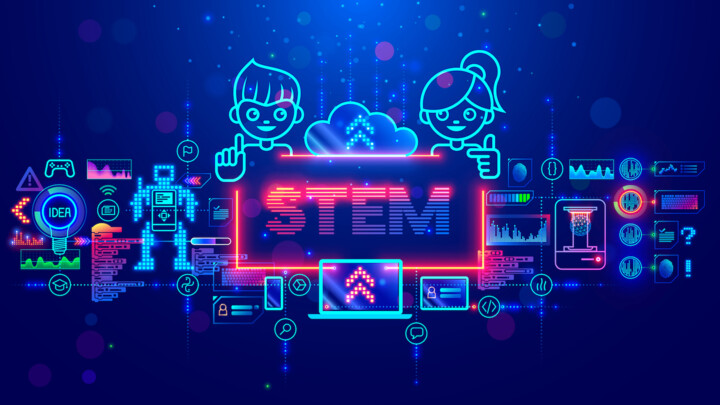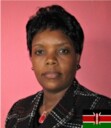How to Narrow Gaps in the Digital World: Build Up Training & Break Down Stereotypes
Esther Kioni from the Internet Society sees training and the disbanding of stereotypes as critical approaches for bridging gaps in the tech world.

© Andrey Suslov | istockphoto.com
dotmagazine: Esther, as the Senior Director of Training and e-Learning at the Internet Society, could you outline the initiatives that you manage?
Esther Kioni: Our initiatives are all about training and e-learning. Before I joined ISOC in 2020, this used to be carried out on a face-to-face mode. But, of course, from 2020 until now, everything has been online. At the moment, we have 12 courses but, by the end of this year, we are going to have 17. These courses are in three different tracks: technical, knowledge exchange & policy and advocacy skills. The courses are either moderated, in which case a moderator meets with the participants for an hour once a week to answer questions in a virtual live session, or in a self-paced format where the learner goes through the course to the very end on their own.
The courses are offered in three formats: high bandwidth, low bandwidth, and text-based. This is because the Internet Society is all about making the Internet available to everyone. Although one person might be able to access content in video format, another person might not have the bandwidth to do so. This is our reason for also packaging text-based versions in PDFs, where the trainees can access the same quality of content as those who have the videos and images. We also have the content in three languages: English, Spanish, and French. In some courses, we are also now exporting the content to Arabic to cater for the Middle East and North African region.
dot: What was the impetus for the formation of these initiatives?
Kioni: As an educator, I have perceived that most people see learning and education as “formal education.” But I always tell young people that training is everywhere. Think of aeronautical engineers, or medics, or farmers. Every career has a training component. So when you talk about the Internet being made available to everybody in the world, as a new technology that is pervasive and that everybody can use, training is also required in this agenda. Everyone must be equipped with skills to use the Internet safely and to watch out for “dangers.” This brings us to the concept of capacity building: Whenever a new technology is introduced, people have to be capacitated to be able to use it. Although the Internet may be available to everybody – it’s everywhere, all around us – in circumstances where people don’t know how to set about taking advantage of it: that is where training comes in. Training to use the Internet, training to configure the infrastructure, training to develop the policies and make sure that there is an enabling environment, training to ensure there is security. Internet security is critical because going online means getting into people’s minds, into people’s homes, into people’s families. Everybody’s on the Internet. So, there must be security. This calls for training in very many ways.
The training of the Internet Society in turn is aligned to the various projects. The Subject Matter Experts (SMEs) are the content creators. Training and e-Learning provides the instructional design expertise – in other words, to pedagogically package the content and turn the text and images into online learning content. On a regular basis, the community with whom we work points out new requirements. For example, of those five courses that we are currently developing, one of them is on Internet security, a topic which has become very important during and after the Covid pandemic, with people now feeling completely exposed while on the Internet.
dot: Which target groups and target countries form the focus of your work?
Kioni: The mission for ISOC is the Internet for everyone, which means that, aside from countries with internal policy restrictions, our courses are open to the entire world. But, of course, we have a focus on those people who are difficult to reach. We find that we have a very heavy audience from the southern part of the hemisphere, and less from Europe and North America. But there’s a focus, for example, on the indigenous community in Canada. Our courses and everything that we do have a global outreach. We really get excited when we see those people where these facilities are not so easily available coming on board.
Kenyan Case Study: Introduction to Networking
“I am presently involved in a pilot project in Kenya which just started in March 2022. The focus of this pilot project is on 18–28-year-old girls who are either at college or pre-college level, and who are seeking to identify which careers to take. In the project, we’ve admitted 80% girls and 20% boys.
“The content of the course, entitled ‘Fundamentals for Designing and Deploying Computer Networks’ (DDCN) was originally developed in the last half of 2021. This course was developed as a result of the following: The technical track is synonymous with starting on a second floor in a building. We felt there was no first floor. We therefore developed a course that built bridges between the second and the ground floor, because there was a big group of starters who were losing out and not joining the advanced courses. To start off on the second floor, skills in networking and a technical background were required. The content for this new course defines: ‘What is a network? What is a protocol?’ etc. It is notable that, last year, the new networking course had the highest intake in comparison to all of our courses. Moreover, since January 2022, this new course has doubled its intake.
“The pilot project in Kenya is now adopting this content. But what is particularly special about this project is that it is specifically targeting young women who have not yet decided which career route to follow and who do not have the technical skills. This is where girls tend to really lose out. Metaphorically speaking: If they directly opted for the technical track (as earlier presented) they’d be coming in when the meal has been cooked – or even when people are having the pudding! We are now calling them to the menu table and asking them, ‘What do you want to be cooked?’ This course is aimed at interesting girls in the technical courses of the Internet. In Kenya, this pilot project will be administered for seven months. We have a similar request from Zimbabwe, where they want to use the same course to train 1,300 18–20-year-olds between June and August of 2022.
“For this pilot project in Kenya, we have an M&E specialist – a monitoring and evaluation person. Because, for the 80% of girls who are going to be in the course, we want to get an insight into their backgrounds and see how they progress. In future, we hope to have a similar project repeated in other countries and regions.”
dot: You’ve been heavily involved in the tech sector for more than three decades. Could you give us an insight into your own background, particularly with regard to what motivated you to study and engage in tech from an early age onwards?
Kioni: I come from a family of 10 children, with seven girls and three boys. For me, the topic of technology is something that started at home. My mother was a teacher and my father was a medic. And as we grew up, there was – unusually – no stereotyping of gender at home. My father worked in hospitals away from home, so we were raised primarily by my mother. And, from her end, she didn’t see us as “boys” or “girls”; we were all simply her children. Because we had cows, all of us used to milk them. Sometimes they would break the fence and get into the maize farm. And my mother had to say, if ever the cows break the fence, you have to mend it. So, I would dig a hole, put up a pole, and pull the wires. These were of course all jobs that were generally stereotyped for men.
My dad, who was a progressive man, used to drive a Volkswagen which refused to start many times. As a very small girl, he’d put me on the driver’s seat and tell me to step on the fuel pedal when fixing it. At the time, my leg would hardly reach the fuel pedal and I would push it. This made me very brave and also made me develop a positive attitude from an early age. I never doubted for one day in my life that I would drive a car. And when it came to my brothers, at home, they would cook for us. In heading out, my mother would say to my oldest brother, “Can you make sure the family is fed?”. At the same time, academically, all of us were also expected to perform well. In my family, there are scientists, from both genders.
Ultimately, when it comes to the issue of girls being defined or taking up careers, parents have a heavy influence right from the outset. The moment when a parent starts buying dolls for a girl or toy cars for a boy, everything goes wrong. By the time they are aged four, getting into school, they already know that “I’m a girl, I’m only supposed to be doing makeup on my doll or cleaning the house” or “I’m a boy, I’m supposed to be playing with trucks or washing the car.” As I see it, parenting plays an extremely strong role on gender definition.
dot: As various studies show, developing countries have a higher digital gender gap than higher income countries. To what extent do you believe this digital gender gap has repercussions for thwarting girls’ potential to become women in tech?
Kioni: It is an issue, because even in my own village, we were laughed at for doing “boys’ jobs.” So, the issue concerning women in tech is real. The woman is supposed to be soft and not to do those hard jobs. But, ironically, at the same time, the woman is also expected to be the farmer, because she’s the one who is on the farm most of the time. And truth be told: that is science. What’s more, the fact that women are supposed to bring up and feed families – that’s also science. Or women are custodians of water, or they look for firewood. Once again: Science. All of this means that women have the biggest exposure to the environment, to science, and to the family; they are the backbone of the society. And I don’t know where the coin flipped – the belief that woman should be disempowered in science is so ironical.
There is also perhaps another issue, which relates to the categorization of the sciences. Life sciences have tended to be the categories that have drawn women in. The other side of the equation is the types of sciences that have been more connected to machines. These are the ones that have drawn more men in. While we have seen our girls being mechanics, the fact that men are more muscular in their stature and were therefore more regularly connected to machines, it somehow got to be interpreted that they were the better scientists.
For all of us, and the world that we are in now, we can no longer afford to say that “You can do this and you cannot do that” from a very early point in life. And when I go for baby showers, that is what I usually share. Nowadays, expectant mothers know from a very early stage what they are about to bring into the world. And you can see what they are buying: a lot of pinks for girls, a lot of blues and dark colors for boys. But what all of us must do, and what I tell them is: “Do not ‘isolate’ this child and define them as either boys or girls.” Let’s look at things from another angle. The boys of today are suffering in our world. When I was studying my Masters in the Netherlands, I was in a student house along with students from multiple countries. Seven of these were men from Ethiopia, and on my first two days there, I ended up cooking for them! On the third day, they came knocking at my door, looking for food. I went ahead and cooked for them on that third day. But after that, I told them “My brothers, your stomach will teach you how to cook.”
What I’m saying here is that, in some countries, the roles of women and men are so defined that men go hungry, as they can’t cook for themselves. So, as parents: when we are raising children, let the boys know how to cook, let the girls know how to fix a car. At the very grassroots, role playing has to be broken down, children have to be laced with all the skills that are required for survival: not women’s skills, not men’s skills: skills for survival.
From a policy perspective: Even in our schools, we have seen that demarcation and stereotyping, where even teachers will tell girls, “Go and sweep” and the boys are told, “Go and cut that tree.” This is something that we need to look at and something that needs to be baked into our policies, especially given the fact that people who are in school are being trained for jobs that are not there. We don’t even know what they’ll be. We don't know the jobs that will be there in 2030, never mind 2050. So, the education system has to be that comprehensive and that wholesome in the sense that whatever comes, either for a boy or a girl, they will be able to deal with it. It has to be a societal approach.
dot: Do you think that, in some countries, it's perhaps getting a little better and that women are becoming more empowered?
Kioni: Yes! I must say that we are seeing it right where I am. In fact, I would say countries like Tanzania and Rwanda have a very serious shift. In Rwanda, their parliament is now heavy with women. I’ve worked in Rwanda and have seen women in ministerial positions; I’ve met permanent secretaries in education who were very young women when Rwanda was being rebuilt. These women were tough, coming from a point of knowledge where they knew that history could not be repeated. They were very protective and were like big chickens trying to protect all the children of Rwanda. They were ready to break barriers.
Tanzania is also interesting, with a female president called Suluhu. That was very unexpected, but she is a fabulous woman with good plans, and a person who’s very level-headed. She surprised many. I’ve also worked in Tanzania, which is one of those societies where women are actually very far down the pipeline. But for all the gentlemen in Tanzania to accept that Suluhu can be their leader – that’s a big shift. There are also many things going on in Uganda, with quite a number of women who are in power. And even in Ethiopia, I must say there is that shift. The fact that men can now accept women to be in leadership positions, even in church!
dot: When it comes to digital education, is there any one of those particular countries where you think: that’s a real role model and they have a system that other countries maybe should be looking towards?
Kioni: Yes, I have seen an approach that is bottom up. Of course, there is a lot of talk to girls with the motto of: “Yes, you can.” That thinking has to sink into the minds of our young girls. When we went to school, we were told you can be a nurse, a teacher, secretary, and so on. There was a list. But now there are so many other jobs that we can’t see. Looking at the telecommunications and Internet industry, for example – this has brought a lot of businesses and new careers. The ripple effect has changed every other career and created new opportunities. Online banking is in every corner, where you can go and transact a lot of money through your phone. Technology is driving the way we eat, drink, think, sleep, talk, and move around the planet. Nobody can live without technology anymore. Not the young, not the old, not the boys, not the girls.
You can see clearly that, for all the jobs which are referred to as digital, these are no longer just set aside for men. The girls of today are not shy. To take one example, the head of the Kenya Power and Lighting Company in Kenya, which is a complete government infrastructure, is a woman. This is only one of the many where women have taken the lead. It is now acceptable that women can be in the digital space, in the technical space, and that is gaining ground.
dot: Within the education system itself, what do you think might work better for girls: individual computer science disciplines, blending tech into other subject disciplines - or a mix of both?
Kioni: For the benefit of girls, I would opt for a hybrid approach. This has a lot to do with how I see girls as being wired. As a mother of a son and two girls, and someone who was raised with boys, I believe that the wiring that is in a woman’s or in a girl’s mind is usually very, very interconnected. Somebody once asked: Is a computer male or female? And I think a computer is female in many respects – especially when it comes to multitasking.
With this in mind, when it comes to education, the possibility of blending technology into biology, mathematics, chemistry, or history removes any element of intimidation. For example, a girl who loves history, or who loves home science, forgets that she’s actually dealing with technology – and, eventually, she can become a master of both. But on the other hand, there are also girls from that mix for whom, of course, we need dedicated disciplines; in this sense, the hybrid model would work the best. But the woman’s brain is very interconnected. From what I have seen – especially for those girls who have already been stereotyped and who have been told that technology is for boys and men – when that technology is baked in into what they love doing, then those fears and those stereotypes can melt away.
Esther Kioni is currently the Senior Director Training & eLearning at the Internet Society. Her work as an educationalist began 20 years ago. She started as a lecturer in the Kenya Polytechnic in mathematics and computer studies. Later, as a Microsoft Certified Systems Engineer, she was involved in the design and implementation of various network solutions in the private and public sector. Her accumulated experience was instrumental in the deployment of ICT solutions in more than 300 schools and the capacity building of more than 5,000 educators. In the last 10 years, she has been an active practitioner in the conceptualization, implementation, and management of e-learning projects targeted at improving teacher education practice through the use of ICT. She holds a Bachelor of Education (Mathematics & Computer Studies) Degree from Kenyatta University, a Master of Science, specializing in Educational Technology from the University of Twente in the Netherlands, and a Post Graduate Diploma in ICT Leadership from Dublin City University.
Please note: The opinions expressed in Industry Insights published by dotmagazine are the author's/interviewee’s own and do not reflect the view of the publisher, eco – Association of the Internet Industry.
This interview with Esther Kioni has also been published as a core part of the eco Association white paper “Girls in Tech: A Call to Action,” which was launched on the occasion of Girls’ Day, 28 April 2022. The white paper is founded not just on top-notch research studies, but also on insights from 15 role models from IT & tech companies and associations in Europe, the US and Africa. The far-reaching paper not only sets out lessons and recommendations for companies, but also key guidelines for policymakers & educators.





